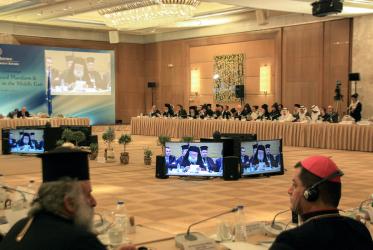Displaying 81 - 100 of 122
04 February 2016
International conference addresses challenges in the Middle East
22 October 2015
WCC urges responsibility for and support to the refugees in Europe
04 September 2015
Christians are called to be peacemakers and to build just peace
02 December 2014
Indigenous faith leaders reflect on resilience and climate change
23 September 2014
WCC honours the legacy of Mandela
06 December 2013
Assembly renews churches’ commitment towards justice and peace
08 November 2013
Dialogue on politicization of religion and rights of minorities
17 September 2013
Cold War politics and the world’s churches
04 September 2013










